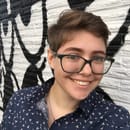Community is something that is unequivocally important at any school—the feeling of belonging, and of knowing that you have a strong support system to fall back on no matter what. But in a large city, with multiple schools and many classmates who you do not meet until graduation, community can be difficult to find.
Unless, of course, some common cause is involved. Unless there is some kind of rallying sentiment that brings people together to form a community that might not otherwise be created, thus allowing people to meet and talk with one another and form the deep, lasting friendships that occur when people work together towards a common goal.
At this moment, that seems to be the role of The New School cafeteria occupation. In an enormous college, with schools that rarely interact, the occupiers have formed a kind of radical community that is creating those kinds of friendships and, in the process, bringing together an originally disorganized and motley group of undergrad and graduate students.
“There’s definitely a community here,” says Kiki Dewar, 19, who has been routinely spending nights in the cafeteria and is working on three of the committees working to further the cause of the occupation. “I’ve been sharing a mattress with people whose names I don’t know—but I know their life story.”
The occupation began in March, when New School president David Van Zandt and Treasurer Steven Stabile made the decision to bring food service operations in-house. Schools have been doing this recently, and would not have ordinarily been a problem—except that in this case, Stabile made the executive decision to lay off approximately thirty workers, some of whom had worked for The New School cafeteria for over a decade, and were planning on retire on this job. After some negotiation, the administration did agree to rehire half of them—but only half, meaning that the workers would have to compete for their jobs, and for their benefits, pensions, and any method of supporting themselves or their families.
For students who knew the cafeteria workers well and considered them friends, this brought shock and outrage—feelings that only grew when the students learned from the workers that Executive Chef Brian DuHart, who would potentially be receiving a $20,000 raise from the administration, was not only adding bacon grease and lard to supposedly vegan meals, but that prior to the occupation, he had also been sexually harassing cafeteria workers and making sexualizing comments about the female students.
The students were upset. The students were—rightly—incredibly angry. So the students took the cafeteria—and made it their own.
And from that, a strange community formed. As someone who has been in the cafeteria on a regular basis, sleeping on air mattresses, couches, and on one uncomfortable occasion, two chairs pushed together, I can absolutely say that the students occupying have formed closer relationships than I have previously seen at the New School—an unintended side effect, to be sure, but one that is very much welcome by the occupiers.
At a school where it is difficult to find community, it seems the occupiers have found it by joining together under a common goal: protesting against an unfair administration. And as more people have come to the cafeteria, they have expanded and grown, and seem to have built something that could last long past this occupation.
The occupiers have not only facilitated the longest New School cafeteria shutdown. They have facilitated the first tightly-knit, solidified New School community. Only time will tell where things go from here—but until the cafeteria workers explicitly tell them to leave, or until their demands have been met, this new community appears to be staying right where it is.
Want updates on the occupation? Follow on Instagram @occupy_tns; on Facebook in The Occupied New School Cafeteria; and on Twitter @occupy_tns
[Image credits: all images by author; second photo taken with permission of the occupiers pictured]



